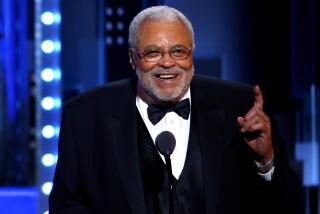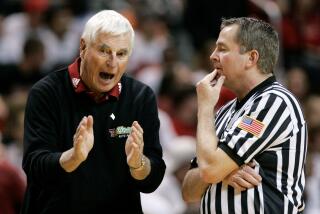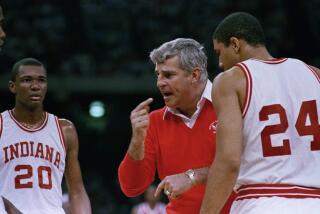Dudley Knight dies at 73; innovative UC Irvine drama teacher
- Share via
For more than 20 years at UC Irvine, Dudley Knight devised innovative and sometimes controversial ways of teaching acting students to speak clearly while lending their characters authentic, unforced accents and dialects.
He believed that actors in a multicultural society should keep their own voices and fought the orthodox practice of teaching them to use upper-class white speech patterns as the favored norm.
Knight, who had retired 10 years ago to Pennsylvania, returned to the campus last month to begin rehearsing his role as King Lear in an outdoor summer festival production of the Shakespeare tragedy.
Shortly after greeting friends and fellow cast members during a get-acquainted meeting June 25, he had a heart attack while walking to his condominium near campus.
He never regained consciousness and died June 27 at Hoag Hospital Newport Beach, said Eli Simon, the artistic director of UC Irvine’s New Swan Shakespeare Festival, who cast Knight in “King Lear.” He was 73.
The methods Knight developed at UC Irvine, where he began teaching in 1981, challenged standard approaches in his field. He criticized — and offered an alternative to — a classic approach for teaching actors proper diction championed by Edith Skinner, a legendary professor who had taught at what is now Carnegie Mellon University and the Juilliard School, and wrote a standard acting text, “Speak With Distinction.”
She urged actors to speak in a set way that she called “Good American Speech” when not playing roles requiring a specific accent or dialect.
In 2000, Knight attacked the methods of Skinner, who had died in 1981, in an article in the academic journal Voice and Speech Review. He called her approach outdated and inappropriate for today’s multicultural world. Her method, he wrote, was “mired in a self-serving and archaic notion of Euphony, and in a model of class, ethnic and racial hierarchy that is irrelevant to the acting of classical texts and repellent to the sensibilities of most theater artists.”
The response from Skinner supporters, he said in a Times interview at the time, made for “as much sturm und drang as you get in the normally sedate world of speech and voice training.”
Knight trained his students to deliver any spoken sound the human voice could produce — an arsenal that could be deployed flexibly as roles and artistic approaches demanded. He codified his method in “Speaking With Skill,” a 192-page book published in September.
For his UC Irvine students, Knight devised an artificial language he called Omnish — after “omni,” Latin for “all,” because it included all vocalizations in most known languages. Students who could master Omnish, he reasoned, would be capable of saying anything well.
“He always introduced it with a deadpan sense of humor, saying it was the national language of the country of Omnia,” recalled Philip Thompson, who studied under Knight in the 1980s and later joined him as a UC Irvine drama professor. “He took the elitism out of voice training while maintaining the rigor, which is a neat trick, and he merged scientific rigor with playfulness.”
Over the last decade, the pair taught the technique they called Knight-Thompson Speechwork to other college-level teachers who train actors.
“It was really important to him that we get out there and communicate this information,” said Thompson, who plans to continue the effort.
The son of a physician, Knight was born July 1, 1939, in Minnesota and grew up mainly in Connecticut. He fell in love with Shakespeare at age 9 when he saw Laurence Olivier in the film version of “Henry V,” he later said.
After graduating from the Yale School of Drama, Knight helped found the Long Wharf Theatre in New Haven, Conn., in the mid-1960s. It became one of the Northeast’s leading nonprofit stage companies.
By the 1970s he was getting small parts on screen and appearing in Southern California theater productions. In the 1980s he had supporting roles in classic plays at the Mark Taper Forum, La Jolla Playhouse and the Old Globe in San Diego. While at UC Irvine, he performed in summer Shakespeare festivals across the country and played the lead in a 1989 campus production of “King Lear.”
Knight and his wife, painter Marta Whistler, moved to Easton, Pa., after he retired from UC Irvine because it was an art colony and gave him easy access to the New York City theater scene, Simon said. Knight continued to perform onstage and served as editor-in-chief of Voice and Speech Review.
He is survived by his wife, three stepdaughters and his brother, Charles.
The Aug. 2-30 run of “King Lear” will be staged as a tribute to Knight, with veteran Shakespearean actor Henson Keys. A memorial for Knight is being planned for Aug. 24 at UC Irvine.
More to Read
Start your day right
Sign up for Essential California for the L.A. Times biggest news, features and recommendations in your inbox six days a week.
You may occasionally receive promotional content from the Los Angeles Times.







